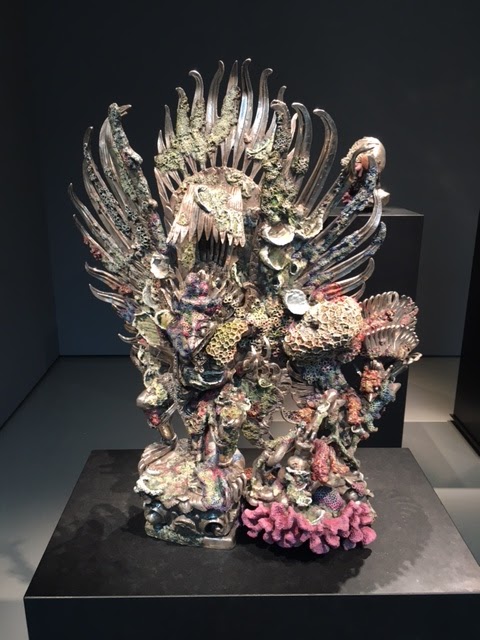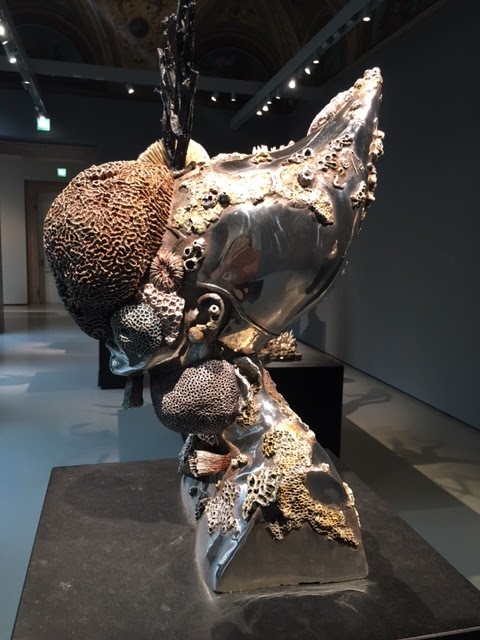Damien Hirst at the Punta della Dogana & Palazzo Grassi...
4:41 p.m.
For the first time ever, the two Venetian venues
of the Pinault
Collection house only one artist: Damien Hirst (Bristol, 1965). The 5000
sq-mt of both buildings, Punta della Dogana and Palazzo Grassi, dedicated to
Contemporary Art, are currently occupied by "Treasures
from the Wreck of the Unbelievable", an exhibition about a
shipwreck occurred during Antiquity. On display, the treasures found under the
sea.
Demon with Bowl (Exhibition Enlargement), by Damien Hirst
Materials: painted resin / Measures:1822 x 789 x 1144 cm
The large scale of the pieces, still covered
with corals and other marine flora and fauna, remind us of the huge pieces of
Antiquity, like Rhodes' Colossus, quite similar in height as the torso which
opens the exhibition on the entrance hall at Palazzo Grassi. But how is it that
Hirst discovered it and moved it to get it to this space? The piece is in fact
a replica of a smaller bronze figurine recovered from the shipwreck. Apparently,
the torso had a saurian head, discovered in the valley of Tigris in 1932, that
represented a demon that the Babylonians considered the King of demons. In his
hand he holds a bowl for human blood.
Two Garudas, by Damien Hirst
Materials: silver, paint / Measures: 36.5 x 23.4 x 27 cm
The Warrior and the Bear, by Damien Hirst
Materials: silver, paint / Measures: 97.5 x 37.4 x 29.1 cm
Huehueteotl and Olmec Dragon, by Damien Hirst
Materials: silver, paint / Measures: 53 x 44 x 40 cm
Head of Sphinx, by Damien Hirst
Materials: silver, paint / Measures: 64.3 x 30.3 x 36.5
General view of the exhibition
As explained in the signs, the Unbelievable was
a ship which original name was Apistos and it carried the amazing collection of
Aulus Calidius Amotan, a freed slave better known as Cif Amotan II. The load
was destined for the construction of a Temple dedicated to the Sun in Asia. In
2008 the precious cargo of the Apistos was rescued in the eastern coasts of
Africa and the discovery can be seen in the screens placed throughout the
museum. However, the collection on display, 100 pieces approximately,
contain replicas and also modern objects. According to the curators, the
exhibition mixes objects of the discovered treasure with a series of
contemporary replicas and other artifacts rescued from the bottom of the ocean.
Among them we see bronze sculptures, marble busts, swords and helmets, coins,
jewels and other historic artifacts. The presence of Mickey Mouse, Goofy and
the characters of Disney's "Jungle Book", or a piece featuring
Rihanna give, to this strange exhibition, an entire new dimension: it's not a
representation or reproduction of an epic collection of Antiquity but an
extravagant and inexplicable mixture of objects.
Mickey carried by Driver, by Damien Hirst
Materials: coated aluminium, printed poliéster and acylic
lightbox / Measures: 152.8 x 229 x 10 cm
Mickey, by Damien Hirst
Material: bronze / Measures: 91 x 71 x 61 cm
Best Friends, by Damien Hirst
Material: bronze / Measures: 72.5 x 136.7 x 82 cm
Goofy, by Damien Hirst
Material: bronze / Measures: 126 x 56.7 x 58.7 cm
Hirst's creative genius makes us smile and
question ourselves how much truth and falseness lies in his approach. The
execution is excellent and the montage, carefully studied. Nothing has stopped
the artist: neither the traditions nor the historic codes. As Pinault said
about the exhibition: “Hirst's artworks don't fit in any aesthetic category or
structure. However, there's a certain mythological power in them”.
Aspect of Katie Ishtar Yo-landi, by Damien Hirst
Materials: bronze and gold leaves / Measures: 164.5 x 90.9 x 66.6 cm
Bust of the Collector, by Damien Hirst
Material: bronze / Measures: 81 x 65 x 36.5 cm
At the Punta della Dogana, a huge 5 mts solar
Aztec calendar rises, inexplicably, in front of a sculpture of The Warrior with
the Bear, taken from the tales of Ancient Greece.
Calendar Stone, by Damien Hirst
Measures: 422.5 x 475.8 x 172.3 cm
The Warrior and the Bear, by Damien Hirst
Material: bronce / Medidas: 713 x 260 x 203 cm
It is said that this is Hirst's most ambitious
and complex project, to which he dedicated 10 years of his career. He was
criticized for making replicas of artworks of the 14th century, but he said
that the exhibition was influenced by several cultures and histories throughout
the planet. The truth is that this is an extraordinary, ambitious and excessive
project that places Hirst in a very particular place in the Contemporary Art
world. The title ("Treasures from the Wreck of the Unbelievable")
comes from the narrative in which this exhibition of mythological, historical
and fantasy elements is centered, mixed of course with Hirst's super creative
imagination.



























0 comentarios